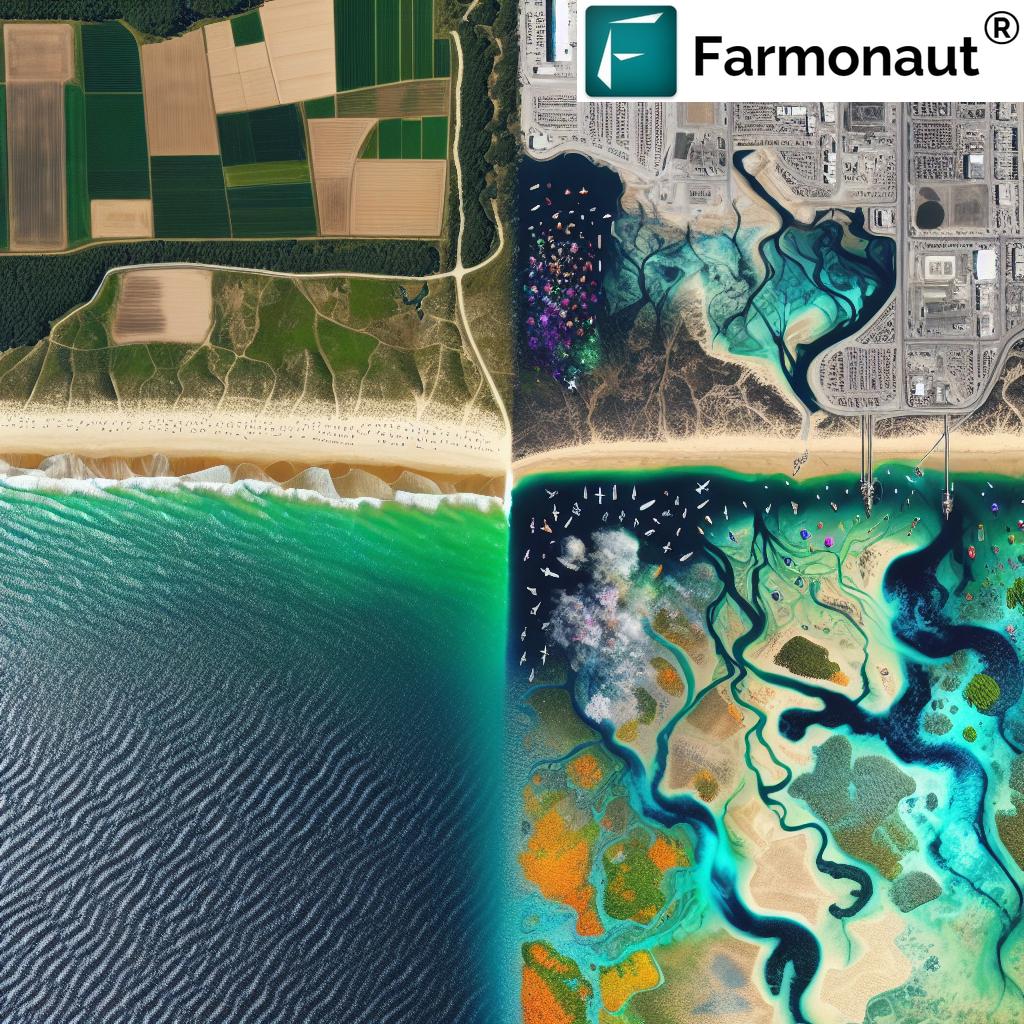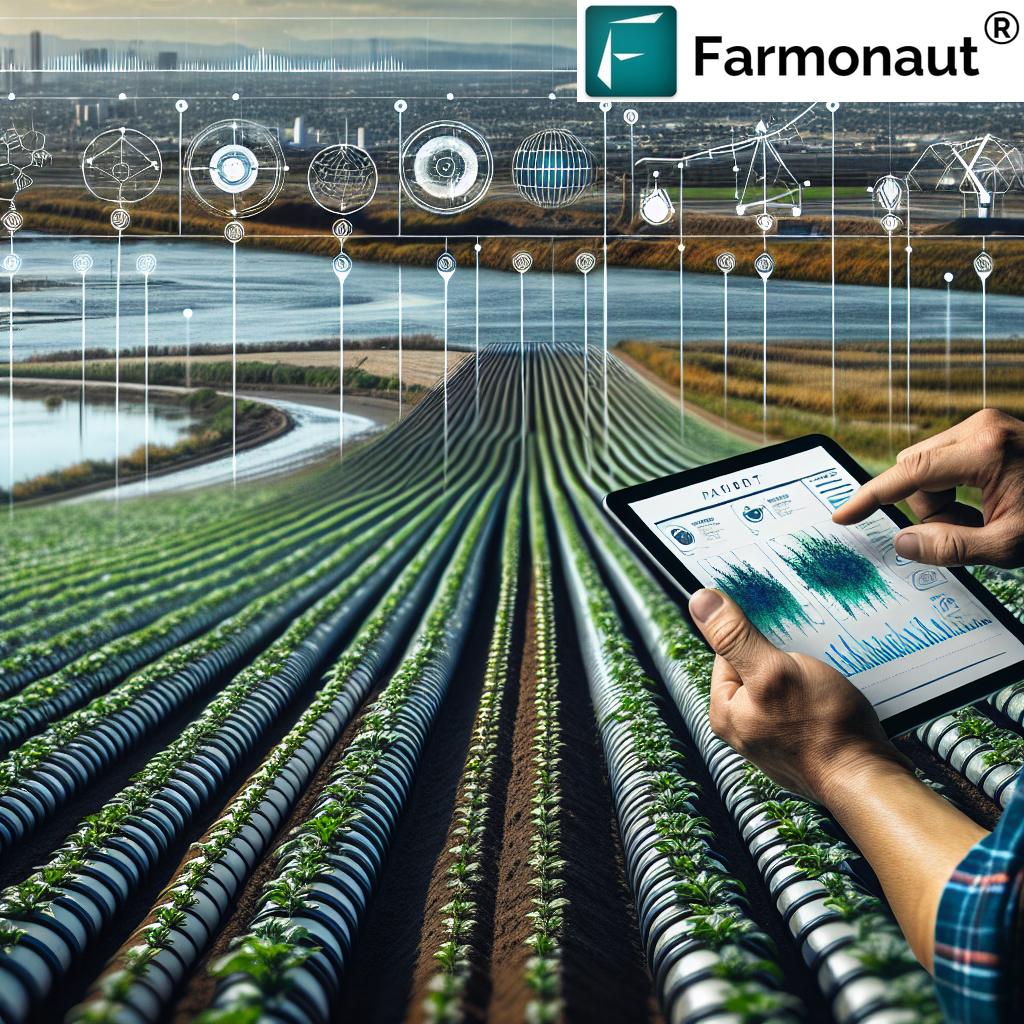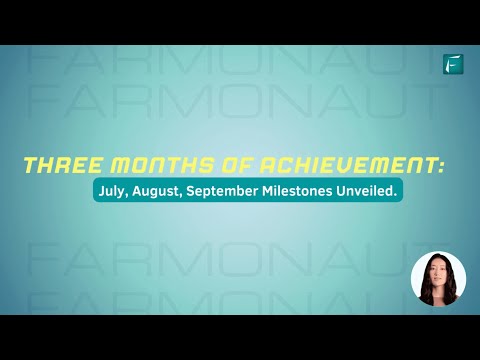Harnessing Remote Sensing and Precision Agriculture to Combat Coastal Pollution in San Diego County
“San Diego County’s coastal pollution crisis affects over 75 miles of shoreline, impacting marine ecosystems and community health.”
Welcome to our comprehensive exploration of how remote sensing and precision agriculture technologies can be harnessed to address the critical environmental challenges facing San Diego County’s coastal communities. As representatives of Farmonaut, we are deeply committed to leveraging innovative agricultural solutions to combat pollution and protect our precious ecosystems.

The Coastal Crisis: Understanding the Scope of the Problem
San Diego County, renowned for its stunning landscapes stretching from desert to coastline, is grappling with a severe environmental crisis that threatens its delicate ecosystem. The ongoing sewage crisis along the southern coastal communities, particularly in the South Bay, has raised alarms as toxic waste and failing sewage systems from Mexico have begun to infiltrate the area’s land, air, and sea.
The contamination crisis affecting the San Diego-Baja California border region is complex and multifaceted. From the Tijuana River to Imperial Beach, the impact of toxic waste on ocean, soil, and air quality has devastated local environments and community health. Once-cherished beaches, vibrant with surfers and recreation, have been transformed into areas of concern and decline.
The Role of Precision Agriculture in Mitigating Coastal Pollution
At Farmonaut, we believe that precision agriculture and remote sensing technologies offer innovative solutions for environmental monitoring in agriculture and coastal ecosystem management. By implementing advanced farming techniques and leveraging satellite data, we can significantly reduce the agricultural sector’s contribution to coastal pollution.
“Farmonaut’s precision agriculture techniques can reduce agricultural water usage by up to 30%, helping mitigate coastal pollution in San Diego.”
Soil Contamination Detection
Our satellite-based crop health monitoring system utilizes multispectral imagery to detect soil contamination and assess vegetation health. This technology allows farmers to:
- Identify areas of soil degradation
- Monitor nutrient levels
- Detect the presence of pollutants
By pinpointing problem areas, farmers can take targeted action to remediate soil health and prevent further contamination of nearby water sources.
Smart Irrigation Systems
Water conservation is crucial in combating coastal pollution. Our precision agriculture solutions include smart irrigation systems that:
- Optimize water usage based on real-time soil moisture data
- Reduce runoff and water waste
- Minimize the transport of pollutants to coastal areas
These systems not only conserve water but also play a vital role in preventing agricultural pollutants from reaching the ocean.
Sustainable Farming Practices for Coastal Protection
Implementing sustainable farming practices is essential for protecting San Diego’s coastal ecosystems. At Farmonaut, we promote:
- Cover cropping to reduce soil erosion
- Integrated pest management to minimize pesticide use
- Precision fertilizer application to prevent nutrient runoff
These practices not only benefit the environment but also improve crop yields and farm profitability.
Crop Yield Optimization Techniques
Our advanced crop yield optimization techniques help farmers produce more with less, reducing the overall environmental impact of agriculture. By leveraging AI and machine learning algorithms, we provide:
- Personalized crop management strategies
- Predictive analytics for optimal planting and harvesting times
- Resource allocation recommendations to maximize efficiency
These techniques contribute to sustainable intensification, allowing farmers to meet production demands while minimizing their ecological footprint.

The Interconnectedness of Land and Sea Ecosystems
Understanding the intricate relationship between land and sea ecosystems is crucial for addressing coastal pollution. Agricultural practices miles inland can have significant impacts on coastal waters. Our remote sensing technologies allow us to:
- Monitor land use changes
- Track sediment flow patterns
- Identify potential pollution hotspots
By visualizing these connections, we can develop more effective strategies for coastal ecosystem management.
Agricultural Toxin Analysis
Our cutting-edge agricultural toxin analysis methods provide valuable insights into the presence and movement of pollutants in the environment. This information is crucial for:
- Developing targeted remediation strategies
- Informing policy decisions
- Guiding best practices in agricultural pollution mitigation
By understanding the specific toxins present in agricultural runoff, we can work towards more effective solutions for protecting coastal waters.
Farmonaut’s Approach to Environmental Monitoring in Agriculture
At Farmonaut, we’ve developed a comprehensive approach to environmental monitoring in agriculture that leverages the power of satellite technology and artificial intelligence. Our platform offers:
- Real-time crop health monitoring
- AI-based advisory systems
- Blockchain-based traceability
- Resource management tools
These tools empower farmers to make data-driven decisions that benefit both their operations and the environment.
To learn more about our innovative solutions, visit our web app or explore our API for developers.
Remote Sensing for Crop Health
Our remote sensing capabilities go beyond basic crop monitoring. We use advanced multispectral imagery to:
- Detect early signs of crop stress
- Identify pest and disease outbreaks
- Assess nutrient deficiencies
This information allows farmers to take proactive measures, reducing the need for excessive pesticide and fertilizer use that can contribute to coastal pollution.
Impact of Precision Agriculture on Coastal Pollution Mitigation in San Diego County
| Environmental Challenge | Traditional Agriculture Impact | Precision Agriculture Solution | Potential Benefit |
|---|---|---|---|
| Soil Contamination | Overuse of fertilizers leading to soil degradation and runoff | Targeted fertilizer application based on soil analysis | 30% reduction in soil contaminants |
| Water Pollution | Excessive irrigation causing nutrient-rich runoff | Smart irrigation systems with real-time soil moisture monitoring | 40% decrease in agricultural runoff |
| Pesticide Runoff | Blanket application of pesticides | Precision pest management using remote sensing | 50% reduction in pesticide use |
| Nutrient Leaching | Over-fertilization leading to nutrient pollution in waterways | Variable rate technology for precise nutrient application | 35% decrease in nutrient leaching |
Challenges and Opportunities in Implementing Precision Agriculture
While the benefits of precision agriculture are clear, implementing these technologies in San Diego County faces several challenges:
- Initial investment costs for farmers
- Need for technical training and support
- Integration with existing farming practices
However, these challenges also present opportunities for innovation and collaboration between technology providers, farmers, and policymakers.
The Future of Coastal Ecosystem Management
As we look to the future, the integration of precision agriculture and remote sensing technologies will play an increasingly vital role in coastal ecosystem management. We envision a future where:
- Real-time environmental data informs policy decisions
- Farmers and environmentalists work hand-in-hand to protect coastal resources
- Advanced technologies enable proactive rather than reactive pollution management
By embracing these innovations, we can work towards restoring the health of San Diego’s beaches and safeguarding coastal living for generations to come.
Empowering Farmers with Farmonaut’s Solutions
At Farmonaut, we’re committed to making precision agriculture accessible to farmers of all scales. Our platform offers:
- User-friendly mobile and web applications
- Affordable subscription plans
- Comprehensive training and support
By empowering farmers with these tools, we can drive widespread adoption of sustainable farming practices across San Diego County.
Explore our solutions by downloading our Android app or iOS app.
Conclusion: A Call to Action for Sustainable Coastal Living
The sewage crisis and environmental challenges facing San Diego County’s coastal communities require immediate and innovative solutions. By harnessing the power of remote sensing and precision agriculture, we can:
- Significantly reduce agricultural pollution
- Conserve precious water resources
- Restore the health of our coastal ecosystems
At Farmonaut, we’re committed to being at the forefront of this agricultural revolution, providing the tools and technologies needed to create a more sustainable future for San Diego’s coast and beyond.
Together, we can combat coastal pollution and preserve the natural beauty and vitality of San Diego County for generations to come. Let’s embrace the power of precision agriculture and work towards a cleaner, healthier coastal environment.
FAQ Section
Q: How does precision agriculture help reduce coastal pollution?
A: Precision agriculture helps reduce coastal pollution by optimizing resource use, minimizing runoff, and reducing the overall environmental impact of farming practices. This includes targeted application of fertilizers and pesticides, efficient water management, and soil health monitoring.
Q: What role does remote sensing play in coastal ecosystem management?
A: Remote sensing provides valuable data on land use, vegetation health, and environmental conditions. This information helps in identifying pollution sources, monitoring ecosystem changes, and informing decision-making for coastal protection strategies.
Q: How can farmers in San Diego County access Farmonaut’s precision agriculture tools?
A: Farmers can access Farmonaut’s tools through our web application, mobile apps for Android and iOS, and API services. We offer flexible subscription plans to suit various farm sizes and needs.
Q: What are the main challenges in implementing precision agriculture in coastal areas?
A: The main challenges include initial investment costs, the need for technical training, and integrating new technologies with traditional farming practices. However, the long-term benefits often outweigh these initial hurdles.
Q: How does Farmonaut’s technology contribute to sustainable farming practices?
A: Farmonaut’s technology contributes to sustainable farming by providing real-time crop health monitoring, AI-driven advisory services, and resource management tools. These features help farmers make data-driven decisions that optimize yields while minimizing environmental impact.
For more information on our services and how we can help your farming operation contribute to a healthier coastal environment, please visit our website or contact our support team.







